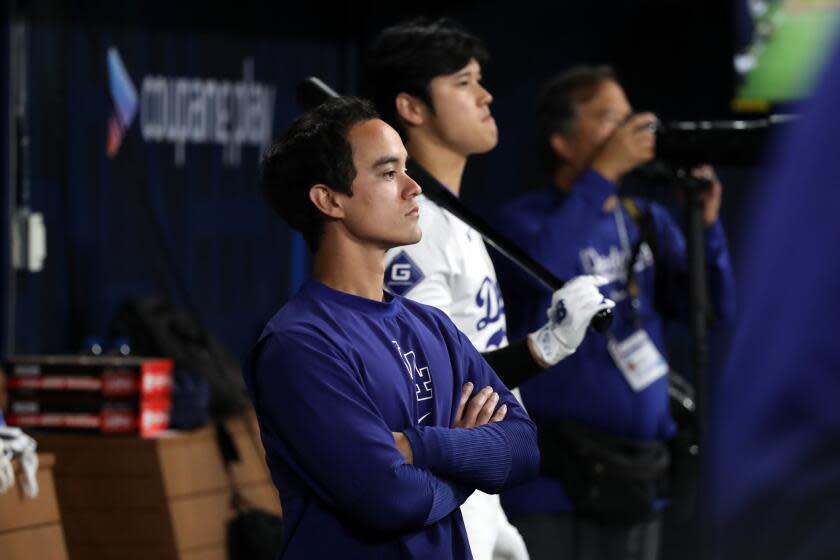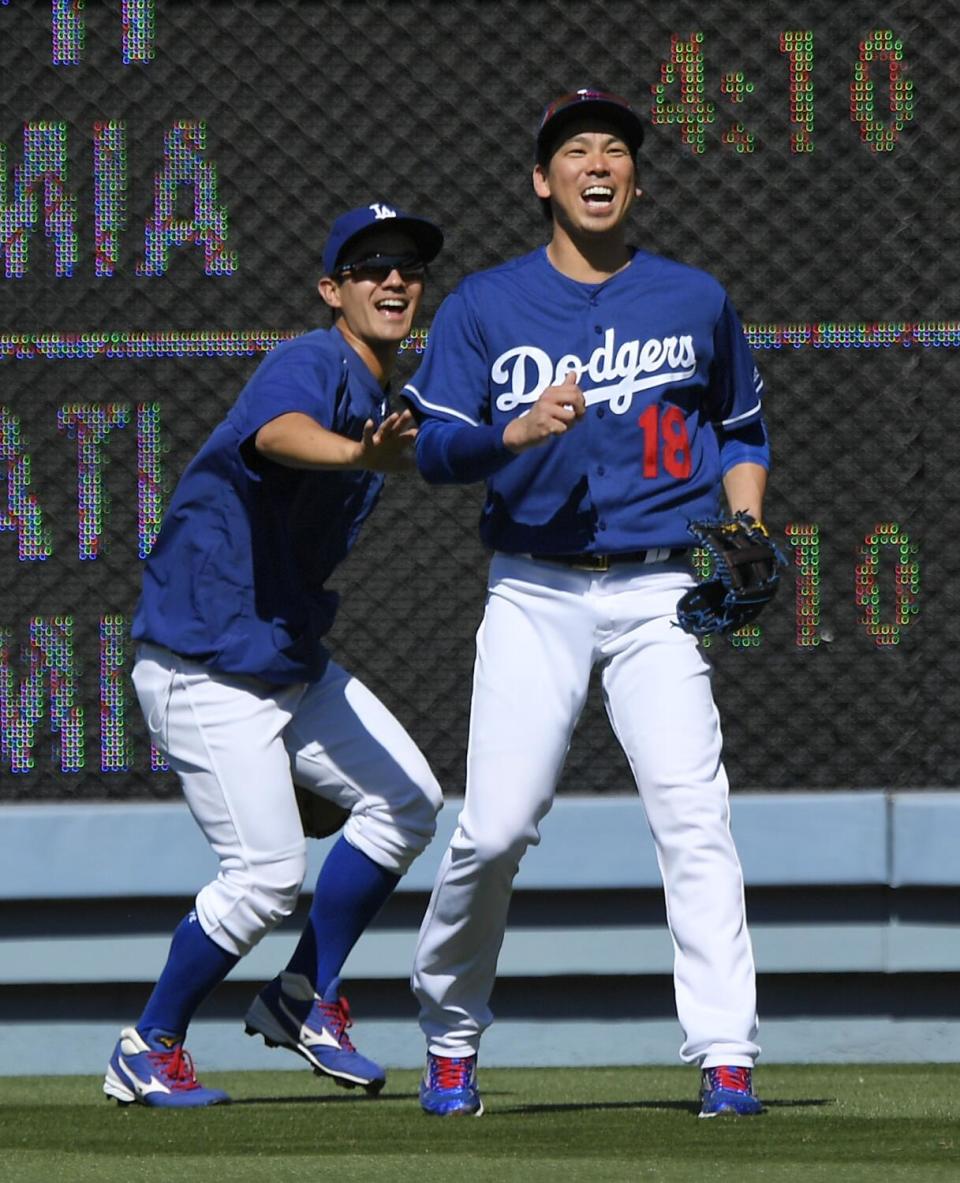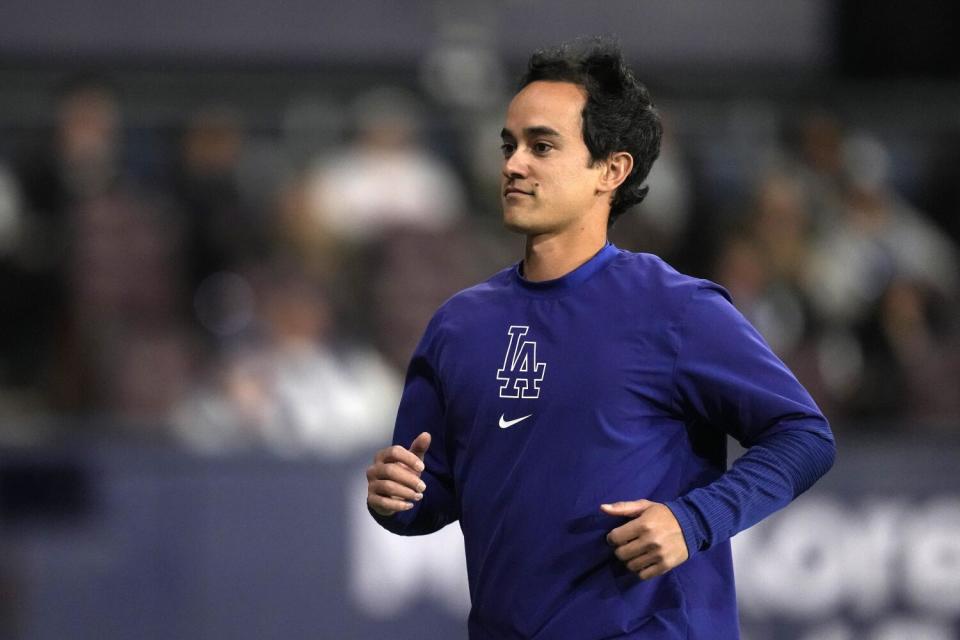Who is Shohei Ohtani's new interpreter with Dodgers? They call him 'Will the Thrill'

Dodgers manager Dave Roberts wore a grim expression while talking to reporters in Seoul last week.
The team had just fired interpreter Ippei Mizuhara, who had been accused by representatives of Japanese superstar Shohei Ohtani of engaging in a “massive theft” of the Dodgers two-way player's funds to allegedly pay off at least $4.5 million in debt to an illegal Orange County bookmaker.
After politely declining to answer several questions around the circumstances of the firing and then responding to one about Ohtani's state of mind, Roberts was asked who would be taking over as the star player's interpreter.
Roberts gave a three-word answer that was accompanied by a genuine smile.
"Will the Thrill," he said.
Read more: Minus ‘buffer’ of Ippei Mizuhara, Dodgers engaging more directly with Shohei Ohtani
Will Ireton has been the Dodgers' performance operations manager since 2020, but many fans probably know him better by the nickname Roberts mentioned. It was emblazoned on the back of the Dodgers jersey he wore as the team's interpreter for Japanese pitcher Kenta Maeda from 2016 to 2019.
Ireton has found himself thrust back into a similar role, at least temporarily, serving as Ohtani's personal interpreter as well as the in-game interpreter for Japanese pitcher Yoshinobu Yamamoto. When Ohtani faced reporters Monday for the first time since the Mizuhara scandal broke, Ireton sat by his side, carefully jotting down the two-time American League most valuable player's words and translating them into English.
Ireton was the one who translated Ohtani's words: “I never bet on baseball or any other sports, or have never asked somebody to do on my behalf and I have never went through a bookmaker to bet on sports.”
“Ippei has been stealing money from my account and has told lies,” Ohtani said. “I never agreed to pay off the debt or make payments to the bookmaker."
Read more: How the saga of Shohei Ohtani and his interpreter unfolded — and why it’s not over
The following day, Roberts described Ireton — whose role as Ohtani’s acting interpreter isn’t permanent, at least not for now — as a “secret weapon” for the team.
“I’m telling you," Roberts told reporters, "this guy is as selfless as a person as you’re gonna find.”
Ireton, 35, was born in Tokyo to a Japanese American father and Spanish Filipina mother. He came to the United States at age 15 and later was an infielder at Occidental College and Menlo College. He was also the latter school's valedictorian for the class of 2012.

That same year he played for the Philippines national team in qualifiers for the World Baseball Classic, which led to a tryout with a Texas Rangers minor league affiliate. He didn't make the team, but Ireton received an internship with the Rangers organization that allowed him to continue working in the sport he loved.
He then worked as an intern with the New York Yankees organization and briefly returned to Japan before landing the gig as Maeda's translator in 2016.
Even then, people in the Dodgers organization sensed an ambition, and instinctual baseball knowledge, that made Ireton a natural fit to one day get involved in baseball operations.
“He just had a good feel for things,” said catcher Austin Barnes, one of the few remaining Dodgers players who worked with Ireton in his role as Maeda’s interpreter. “Sometimes you work with translators and you don’t know how things are actually translated. But Will, you felt good about it. Having meetings with them, you felt he was relaying the gameplan and concepts really well.”
Allowed to take part in certain drills during spring training, Ireton was dubbed "Will the Thrill" by Dodgers president of baseball operations Andrew Friedman because of the effort he exerted during that time in the field.
Ireton also was known to whip the team into a frenzy with his dugout dance moves, on at least one occasion by apparently lifting 405 pounds in a high-energy performance Maeda dubbed "Will's Deadlift Challenge" in a pair of 2017 Instagram videos.
Read more: What to know about the Shohei Ohtani interpreter gambling scandal
Even this week, as Ireton returned to the spotlight alongside Ohtani, a Google search of his name prominently featured an image of him in the wrestling singlet and tiger mask he wore, in jest, during that lift.
“I can’t say enough about Will,” hitting coach Aaron Bates said. “He’s amazing.”
“When we first met Will, he was sort of laid back, a little bit shy and reserved," Dodgers executive vice president and chief marketing officer Lon Rosen said in a "Backstage Dodgers" feature. "But very quickly we got to see the real Will — Will the dancing machine.”
After Maeda was traded to the Minnesota Twins prior to the 2020 season, Ireton remained with the Dodgers organization. He spent a year as a player development coach for the triple-A affiliate in Oklahoma City — going to the minors at the recommendation of the Dodgers front office, in order to gain baseball operations experience — before returning to the big league club as performance operations manager in 2020.
His exact responsibilities in that capacity?
“It’s kind of hard to say exactly what he does, because he does so much,” third baseman Max Muncy explained. “He’s one of those key pieces behind the scenes that never gets any credit, even though this whole operation would be tough to run without him.”
Read more: Shohei Ohtani leaves unanswered questions after blaming his interpreter in gambling scandal
Initially, Ireton handled smaller tasks in a support role for the team’s coaching staff. He learned how to operate advanced training and data-collection equipment, such as the Trackman systems the Dodgers use on their spring training fields. When MLB suspended the use of in-game iPad videos during the 2020 season, he ran printed sheets of pitch locations and sequences from the clubhouse to the dugout, so that hitters could study previous at-bats before their next trip to the plate.
“[He handled] little things that always have to get done,” hitting coach Aaron Bates said. “Both on the pitching side and the hitting side.”
Over the last couple of years, Bates said, Ireton’s role with the team has only grown. He has “delegated” many of those smaller daily tasks to take a more hands-on role in the club’s game-planning operation. He plays an integral part in compiling the analytical information and scouting videos of opponents that the players rely on for game preparation.
“He’s great at it,” Muncy said. “He’s been a key piece for us for a lot of years now.”

The Dodgers declined to make Ireton available for an interview this week. But last fall, while taking part in a panel discussion at the Japanese American National Museum in Los Angeles, he described his job “in a nutshell basically is to be a touch point for every department” and sometimes requires 12-hour workdays during the season.
"I make sure that everything that the coaches and players need for that day, whether that be scouting materials or information from analytics to information we get from video — everything that the coaches and players need, I provide or make sure that I provide for them in a timely manner," said Ireton, who added that he also plays a role in the scouting department.
Read more: Is Shohei Ohtani too big to fail?
Roberts, whose mother is Japanese and father is Black, took part in the same panel discussion.
"There’s always players coming from Japan and so he always liaises on stuff like that ... and we count on him for a lot of things," Roberts said. "He’s like a hired gun, so whether it’s the minor leagues, a potential draftee, a potential trade or stuff that internally for that night’s game or kind of looking or projecting down the road and establishing, you know, building on relationships that we have in Japan, he’s the point person for the Dodgers."
Becoming Ohtani’s acting interpreter has stretched Ireton’s responsibilities even thinner, Roberts acknowledged Tuesday. But, it has also made his presence around the team — and the trust he has spent years engendering from players and coaches — more important than ever.
“Will is a Swiss army knife,” Roberts said of Ireton. “He does everything for us.”
In the wake of this past week's events, those words have never rung more true.
This story originally appeared in Los Angeles Times.
